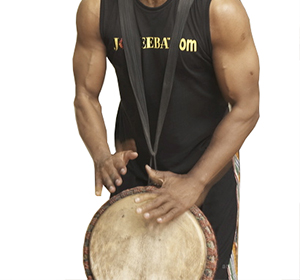About Us
Djoniba Dance & Drum Centre, Founded and Directed by Djoniba Mouflet
Since its inception in 1992, Djoniba Dance & Drum Centre, Founded and Directed by Djoniba Mouflet, has striven to celebrate global diversity by offering a stunning variety of the best dance classes for adults and children, including African, Brazilian, Haitian, Cuban, Caribbean, Salsa, Capoeira, Zumba, and Belly Dance.
The story of Djoniba Mouflet is an inspiring one. Born in Martinique and spending many of his childhood years in Senegal, Mali, and Guinea, West Africa, where he trained with renowned masters of West African drumming and dance in small villages, as well as in performing arts schools and companies, Djoniba’s unique talent won him a scholarship and sponsorship by the Dance Theater of Harlem, inviting him to come to the United States. He has come a long way from his impoverished childhood, days without food, and his nights sleeping on the New York City subway to his current success, never allowing any barriers to stop him from following his dreams.
After thinking up the concept and spending one year searching for a location, in March 1993, Djoniba Mouflet finally found a space, signed a lease, and began his new journey on the road to becoming the first Black man to open a cultural center in Manhattan, New York City dedicated to the promotion and advancement of African and Pan-African dance, music, and culture. When contemplating the logistics of opening up a dance center with little financial backing, Djoniba remembers being deeply inspired by Spike Lee’s method of using credit cards to finance his first movie. “I saved every dollar I made, applied for credit cards, took small loans from friends, and decided to do most of the construction work myself,” Djoniba explains.
“One of the most important principles I learned from business books was that it is crucial to do what you love first and money will come with that passion,” Djoniba reflects. While he had no formal construction experience, Djoniba always enjoyed building things with his hands: “My dad is a carpenter, another uncle was a homebuilder. I learned to build by reading books and by helping some contractors on their projects, so when I found out it would cost me much more money than I could afford to build my school, I decided that I would do the construction myself with friends and students with knowledge in construction and learned so much more that way! I snapped lines, posted tracks and studs, we did the soundproofing, built floors entirely from scratch, and so much more.” For Djoniba, building the Centre was like creating a sculpture from marble: “First you have materials and then you build something with them! Building Djoniba Centre was building a piece of art.”
On April 1st, 1994, after 1 year of intense construction and two years of preparation, Djoniba Mouflet finally opened Djoniba Dance & Drum Centre at 37 East 18th Street, by Union Square. Without the money or formal experience, Djoniba accomplished what seemed unlikely by opening the first school dedicated to showcasing the beauty of Black people, from Africa and the African diaspora, through dance, music, and culture. The school’s grand opening attracted a huge crowd of family, friends, students, and various supporters from near and far. Thinking back to that day 25 years ago, Djoniba recalls, “I was so caught up in doing construction, being the foreman, organizing, thinking, and planning all the time that I never got a chance to reflect back on the grand opening day. It just came,” he laughs. “But thanks to the ancestors’ guidance and my mother’s protection, the construction went well.”
Djoniba Mouflet was the C.E.O., Executive Director and Chief Strategist running all operations at Djoniba Dance & Drum Centre (DDDC). His leadership and innovative mind was behind every aspect of all strategies created for the business, from marketing and rules and regulations, to different administrative procedures and student customer service. Through his leadership, hard work, and dedication, DDDC became one of the best dance schools in New York and the world.
Having established an institution with such a profound mission, Djoniba’s lifelong work has led him to become a crucial ambassador for the promotion, preservation, and recognition of African and African-Diasporic dance, music, and cultures. Reflecting on the challenges of running a business in a city like New York, Djoniba puts forth that one “must be able to adapt, find solutions quickly, and compromise.” “You must learn to adjust by listening to people around you, your staff and customers. Your ability to innovate and find new ways for small details of the operation is vital,” he states.
Djoniba also notes that growing up in Senegal greatly influenced his businessman mentality: “Growing up in Senegal, I learned to hustle and the importance of being an entrepreneur.” Prior to the Centre, Djoniba had various business ventures, from buying and selling goods and importing motorcycles with his friend Kabirou in Senegal, to having a store in SoHo and doing real estate in New York City. His driving force throughout the years was simple: “I vowed to never be poor like growing up in Martinique and Africa again, so I really learned to innovate, to work hard, work for myself, and to never be afraid to take chances, like I learned in Senegal.”
From ABC, New York Times, CNN, and many other publications, DDDC received worldwide recognition and countless awards, including a proclamation from the City of New York for its “15 years of outstanding service to the community.” Former New York Mayor Michael Bloomberg congratulated Djoniba for his hard work, stating he and the City “look forward to even greater achievements on the horizon.”
A home to many, DDDC became the first school for artists just arriving from Africa, South America, the Caribbean, to get their first chance to teach, work, and make a name. By giving more than 300 hundred Black and Latino artists an opportunity, Djoniba became a respected representative and voice for those artists. “We became a big family,” Djoniba reminisces. “Because of the school, I have an incredible network of artists who always support my projects, from Brazil, Haiti, Cuba Guinea, Senegal, Ivory Coast… I can always count on them.”
Then in 2008, due to the economic crisis, DDDC closed its doors after over than a decade on 18th Street. Instead of opening a new school, Djoniba partnered with Igal Perry of Peridance Capezio Center in Union Square, Manhattan, another dance school, where DDDC is still currently located.
Thinking back to the decision, Djoniba discloses that “closing the school that I built from scratch was very difficult but I had to be pragmatic, so making the decision to partner and join forces with Peridance was a way to confront the grim economy and actually gave me more time to focus on other projects.”
In Fall 2018, DDDC formed a new partnership with Pascal and Joyce Rioult, Founders and Artistic Directors of the globally-recognized Rioult Dance Company. “We had close to 300 teachers who taught at Djoniba Dance Centre over the past 25 years, and I kept on getting the request for more space and classes, so this was the perfect opportunity to give teachers and drummers a new space to share their infinite knowledge and skill,” Djoniba says. In the midst of opening up their first dance school in a newly-built facility in Queens, Pascal and Joyce sought to form a partnership with Djoniba Mouflet because of their understanding of and DDDC’s legacy, contribution to the world, and the quality and vast skills of their teachers and drummers.
After several months of negotiation, the two finally signed a contract and finalized their partnership for Djoniba Mouflet to bring DDDC, it’s teachers and all their talent to Rioult’s new location at 34-01 Steinway Street/34th Avenue in Long Island City, Queens. “Pascal and Joyce truly showed their appreciation of our expertise, experience, and talent, which helped greatly to seal our partnership. It also made sense for Djoniba Dance Centre to expand to another borough aside from Manhattan. While it will take some time to develop—since Manhattan is the epicenter of the city while Queens caters to its community—the location is only 10 minutes from Manhattan and three stops into Queens on the train, so I have no doubt that our new Queens location will thrive.”
A vital artery pumping culture throughout New York City, Djoniba Dance & Drum Centre has laid down the foundation in assuring that African and African Diasporic dance, music, and culture are respected, safeguarded and revered throughout the world. With a quarter century already under its belt, both Djoniba Mouflet and DDDC have a road of success awaiting them. “I’m looking forward to continuing working with Peridance, Igal, and Ron, and now helping build Rioult with our program there,” Djoniba expresses. “I also look forward to developing new concepts and ideas I’ve had for a long time and to do everything in my power to help continue the mission bestowed unto me by my African ancestors to continue showcasing the strength, beauty, and power of Africa and its vast diaspora.”




